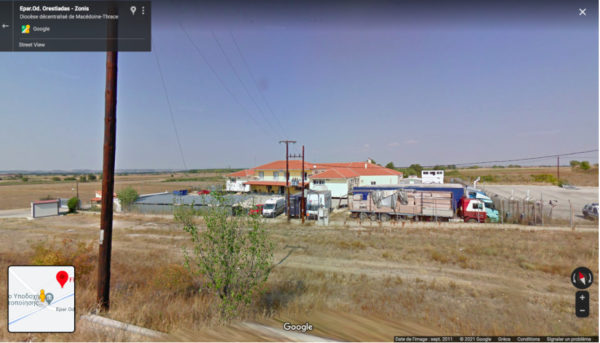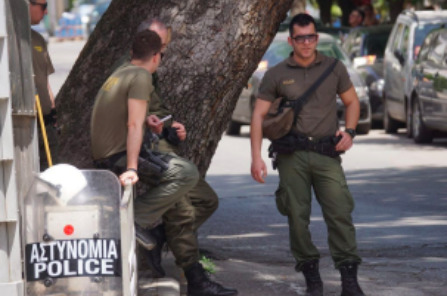The respondent, a 26 year old man from Syria, was walking in a group of 10 people, all Syrian. The group ranged from 12- 56 years old and was composed of 8 men and 2 women.
The group walked from Edirne at 11pm on 01/09/2021 to the Turkish-Greek border and waited at the border for 2 hours before crossing the fence. After crossing, the group walked for 2 days in Greece, covering around 30km on foot. The group would walk for 3 hours, then rest for 30 minutes and walk again.
The group was walking in a forest close to Orestiada when they were apprehended by 3 officers in a dark blue ford van wearing civilian clothes. The officers asked the group where they were from and they replied that they are Syrian. One officer said ‘You are Muslim and we are Christian why do you come to a Muslim country?’ The officers spoke to the group in English but to each other in Greek.
The officers forced everyone to take off their shoes and belts. They then took the phones of the group and broke them and searched their bags. All members of the group were forced to kneel for 45 minutes on the ground. After this time a van arrived and the group was loaded into the trunk.
Once all members were in the van they drove them for 15 minutes along an unpaved road to the detention site. The driving of the officer was fast and reckless, and members of the group collided with each other in the back of the van.
The group arrived at the detention centre, identified by the respondent as Orestiada Fylakio (pictured below). The centre was at the side of the city and surrounded by a 2-3m fence.

At the detention centre there were 5 or 6 officers wearing a uniform consisting of Sage Green pants and shirts with a small logo of the Greek flag. 2 of them wore balaclavas and all of them carried guns and batons. The respondent identified the uniform to be the same as pictured below:

The group arrived at the detention centre at around 10am on 03/09/2021. The officers forced the group to stand in a line and remove everything from their pockets. They then forced the men to undress, so that they were completely naked. At this point the officers banged the respondents head against the wall ‘with all their force’.
They returned only shirts and pants to members of the group, but not the rest of their belongings. One member of the group had a heart condition, and the officers confiscated his medication. He pleaded for his medication to be returned, but this made the officers angry, and they then refused to return his clothes. They only returned his underwear.
They separated the women from the rest of the group and did not search them.
At the detention centre there were around 100 people detained. Detainees were from Syria, Morocco, Afghanistan, Turkey and Iraq. The detainees ranged from 2 to 52 years old and there were 4 women also detained with their children.
The officers then loaded an entire group into 3 camouflage jeep vans with around 30 people in each van. Two officers were with each van, wearing camouflage pants and the sage uniform shirt and balaclavas.
The vans drove for 30 minutes along a paved road to a pushback site by the Evros/Meric river. The driving was reckless and the passengers struggled to stay standing.
At the river, the officers unloaded the passengers from the back of the van. The site was a forest next to a river. The respondent could see a small light on the Turkish side of the site. The Turkish side of the river was all agricultural lands and the respondent could also see red lights.
The officers beat all passengers with their batons as they got out of the van. One of the officers spoke in Turkish and told everyone to kneel down in a line. He said if they had money they had to take it out, ‘ if we search you and we find something we will beat you hard.’
One of the officers spoke Arabic in Syrian dialec. The Turkish, Arabic and Greek officers communicated with each other in sign language as they did not speak the same language.
The officer speaking Syrian Arabic told the respondent that the police had made a deal with them, that if he worked for them for 3 months they would give him a paper to cross Greece. He said that he had been told to take everything and beat everyone. The respondent told the Syrian officer that he had money in his back pocket, and the officer cut out the money with a knife and took it. The officers beat the respondent with a branch and kicked him repeatedly.
When the vans arrived at the detention site, there was already one boat waiting at the river. It was thought where they were on the Greek side it was near to Dilofos. It was grey plastic, and around 2m by 1m in size without a motor. They loaded 8 passengers into the boat, and 2 officers to drive.
The officers drove the boat into the middle of the river and told the passengers to jump out. The water was deep, about the height of the respondents chest, and they also forced the women to jump in at this point with their children.
The group did not get the opportunity to ask for asylum at any point as they were too afraid. The respondent stated ‘they made us afraid to go back again (to Greece) and they didn’t give us anything.’ They also did not receive food, water or medical help at any point from the officers. The officers took pictures on their phone of all members of the group, but did not fingerprint them or register any asylum claim.
After climbing out of the river on the Turkish side the group walked for 3 or 4km to the village of Yenikadin.
